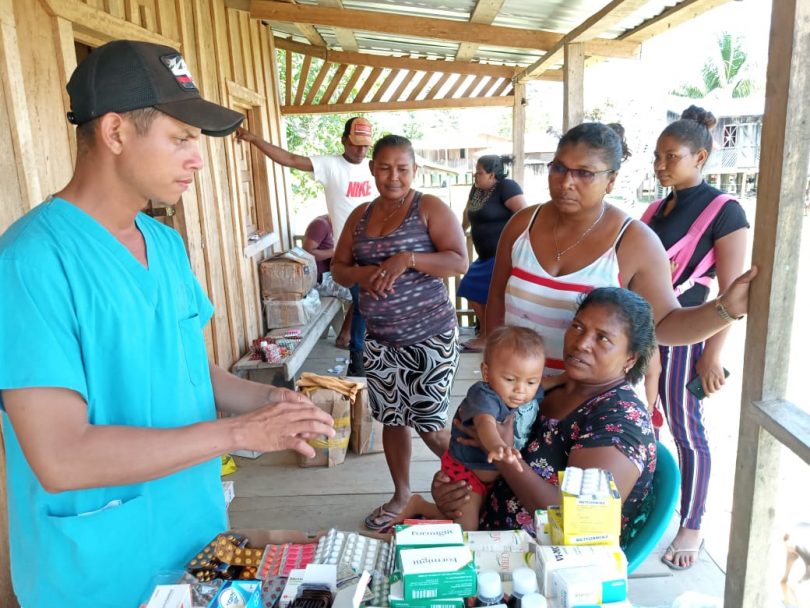The Wilderness Prophet
The Rt. Rev. Chris Giesler
Director of Mission Engagement
Assigned Lessons:
- Zephaniah 3:14-20
- Isaiah 12:2-6
- Luke 3:7-18
Following up on last week’s Gospel lesson, we continue our somewhat uncomfortable encounter with John the Baptist out in the Judean wilderness.
I often judge the impact of a holiday in our society by the number of greeting cards you can buy at the store tied to that day—ever seen an Advent greeting card? Probably not. And perhaps the reason for that is that the poster child for Advent is none other than John the Baptist. So, what do you suppose would an Advent Greeting Card look like?
A picture of John the Baptist might be on the cover of this card. This, of course, would be a strange sight because John is hardly gentile in appearance. He’s dressed in camel’s hair with a leather belt, and he eats locusts and wild honey. Not exactly an inviting image.
But as if that is not challenging enough, we come to the inside message from John. So, here we go, quoted right from Luke’s writing:
“You brood of vipers! Who warned you to flee from the wrath to come? 8Bear fruits worthy of repentance. Do not begin to say to yourselves, ‘We have Abraham as our ancestor’; for I tell you, God is able from these stones to raise up children to Abraham. 9Even now the ax is lying at the root of the trees; every tree, therefore, that does not bear good fruit is cut down and thrown into the fire.”
Now you see why we don’t have Advent greeting cards. We’ve got a screaming prophet in funny clothes calling all who would listen “a brood of vipers,” and he is telling them to bear fruits worthy of repentance. But what does that really mean? Repentance is different than confession, and we sometimes forget that.
Confession is the act of admitting that we are wrong. It is not just about finding an excuse for what we did wrong; it is about fundamentally acknowledging that we have done wrong and giving voice to that. On the other hand, repentance is the act of changing our lives and changing the way we act in the world. Confession is admitting we are wrong; repentance is changing our way of acting so that we don’t do that wrong again.
In Luke’s account of John’s Advent greeting, he shares John’s dialogue with those who have come to listen and are interested in responding. Here we read:And the crowds asked him, “What then should we do?” And John said: “Whoever has two coats must share with anyone who has none; and whoever has food must do likewise.” Even tax collectors came to be baptized, and they asked him, “Teacher, what should we do?” He said to them, “Collect no more than the amount prescribed for you.” Soldiers also asked him, “And we, what should we do?” He said to them, “Do not extort money from anyone by threats or false accusation, and be satisfied with your wages.”
So, if John were here today and we asked him, “what we must do?” What do you think that he might say? I could hear him saying:
- Employees, don’t cheat your company.Give an honest day’s work, care for those who work with you, look out for the needs of your customers.
- Employers, don’t take advantage of your employees; pay them as well as you can so that they can support their families.
- Husbands and wives, honor your spouse, serve them as Christ serves the church. Love each other with the same unconditional love with which Christ loves you.
- Children, respect your parents and honor them with your obedience. Parents, love your children as the gifts from God that they are. Do all that you can to empower them to serve the Lord with gladness.
- Teachers, know your subject matter well and teach with a passion. Encourage your students to succeed as if they were your own children.
- Those of you working in the medical profession, have compassion for the suffering of those that come to you for help and healing. Remember that they are human beings with an illness, not the other way around.
- Church members, Support your congregation with your best effort. Give in terms of your time, sharing your talents, and giving of your treasures. Strive to tithe so that your congregation can fully engage in its mission.
Fundamentally, all of this begins with a desire to have the presence of God to break into our lives in such a way that our view of the world changes to be more like the perspective of Christ. By doing so, we can help usher the very kingdom of God into our world. How is that for an awesome mission?







